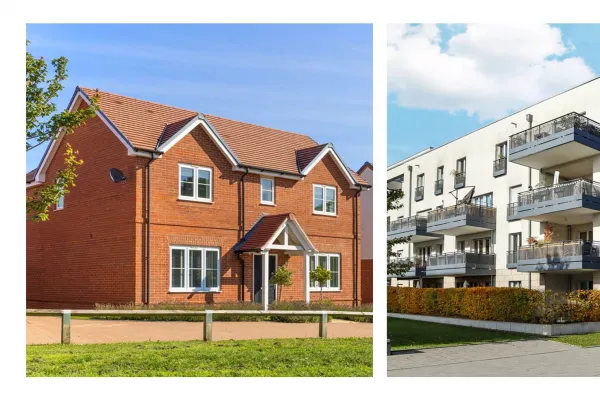Lots of homeowners are keen to want to find out the origins of their property.
This might be simply because they are interested or for other reasons.
We’ve explained how you can find out the age of your house in the blog below. Keep reading to find out.
How to find out when your house was built
There are several potential ways to find out the age of your house. Any one of these, or a combination of them, could give you the answer.
1. Check the HM Land Registry
His Majesty’s (HM) Land Registry stores all information about land ownership in the UK.
This focuses on land rather than what is built on top of it. It may still provide a clue about when a previous owner took over.
2. Check your property’s title deeds
Your house’s title deeds may be the best way to find this information. It gives proof of ownership and past information about a registered property. This could include its age.
3. Ask your local authority
Your local authority may hold details about all properties in the area. Contact them and ask them to look through their archives. They may even be able to answer up-front.
4. Contact the home’s previous owners
You could contact the previous owners of the house. They might have information about the property’s history. This is especially likely to work if they built the property themselves.
Other ways
A few more ways you could find out your property’s age include:
- Contact your local history society
- Pay for a professional historian to look it up
- Check Census records
- Ask local estate agents
- Speak to the developer (if you can find out who it is).
Why is it important to know when a house was built?
Insurance
The main reason people want to know a house’s age is insurance. Building Insurance companies usually ask for the age of your home.
An approximation is usually acceptable in this situation. But you’ll need to investigate if you have no idea of a rough figure.
Older homes cost more to insure.
Building materials
Providing the wrong property age could leave you underinsured or mean your claim is rejected.
When you want to make changes to your house, knowing its age is important. This might include an extension or a loft conversion.
You need to use the correct materials and methods when renovating it. You also want to avoid doing anything that will permanently damage the house.
Knowing the property’s age gives you insight into all of these details.
Energy efficiency
Energy efficiency is also a significant concern for property owners in the UK.
Knowing when your house was built provides context on what is or isn’t in place already. You can update your energy efficiency using appropriate materials.
For example, if you need new roof tiles to implement solar panels, you can find the ones appropriate for your house.
Selling information
Your property’s age is often relevant when you sell it. Potential buyers might want to know and ask for the paperwork as proof. Period properties also tend to sell for more.
Pure curiosity!
Another common reason is because you are interested. You might hear rumours that your house has an interesting history, which you want to confirm.
How old are homes in the UK on average?
Many properties in the UK were built during the Victorian era (1837 to 1901). There was an increased number of houses constructed during this time.
Data shows that one in six homes in England (15%) and one in five in Wales (23%) were built before 1900.
Homes in England and Wales were mostly built between 1930 and 1982 (46% in England and 39% in Wales). In England, 7% were built in 2012 or later, and in Wales, 5%.
Are older houses more popular to buy?
There needs to be a direct link between the age of a property and its popularity.
On Rightmove, houses from the following eras are the most searched (in order):
- Victorian (1837 – 1901) (the most popular)
- Georgian (1714 – 1830)
- Edwardian (1901 – 1910)
- Tudor (1485 – 1603).
What are the most common house types?
The house type that is most common in the UK is semi-detached. 30.6% of properties in England are semi-detached and 30.9% in Wales.
What is the oldest house in the UK?
Technically, the oldest standing house in the UK is the Knap of Howar on the Orkney Islands’ mainland. It is estimated to be about 3,700 years old.
However, nobody lives in the Knap of Howar, so the the oldest continuously lived-in house is Saltford Manor house in Somerset, which is approximately 800 years old.
Can you find all planning applications for your property?
Plans for all new developments that need planning permission are made public by the council. This is available only in England and Wales.
Contact your council for their records of all planning applications made on your house.
Keep in mind that this might only stretch back to a specific date. Records have not been available for a long time.
Will my property’s age affect its value?
Yes, your property’s age tends to affect its value.
Some construction methods are considered ‘typical’ and others ‘atypical’, which impacts valuations.
And, as described above, buildings from some eras are more prestigious than others.
Your property’s age also impacts Building Insurance quotes. It may also force you to use more expensive materials when carrying out extensions.
The most intelligent house buyers will consider these factors. They might change their offer accordingly.
Will my property’s age affect building insurance?
In many cases, yes. Older properties are often more expensive to insure.
This is because they might not meet modern standards – there’s a greater risk that something could go wrong. Speak to an insurance expert for more guidance on this subject.
Can you get a list of all the previous owners of your house?
Title Deeds will outline the previous owners of your property. These records may run out at a certain point.
HM Land Registry also provides details about previous owners of the land.
You can find this information yourself. Contact the previous owners and ask for the details of whomever was before them.
You can follow this procedure for as long as possible. Even when older owners have passed away, you may be able to contact their family.
This is a far slower and less efficient way of doing it, though.
















